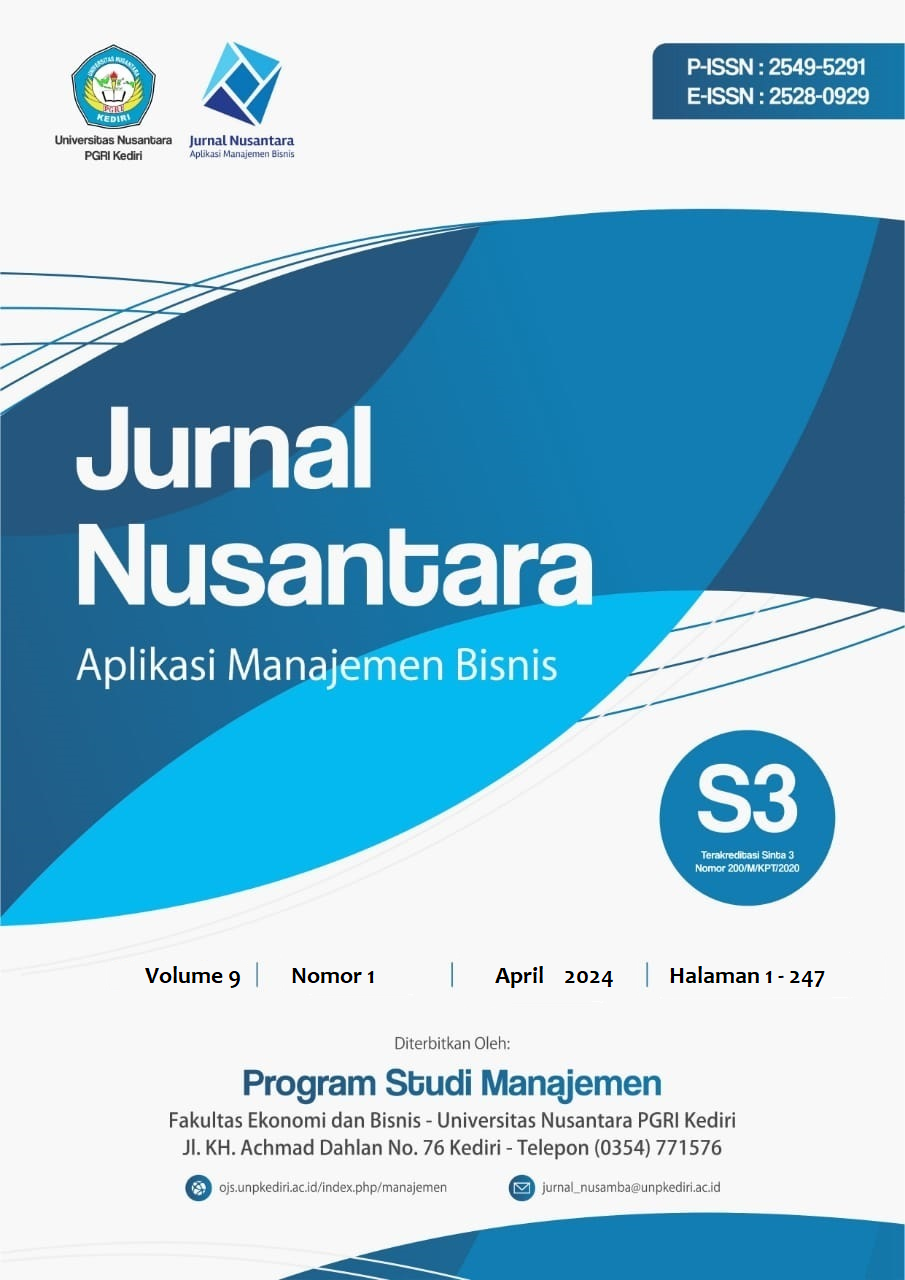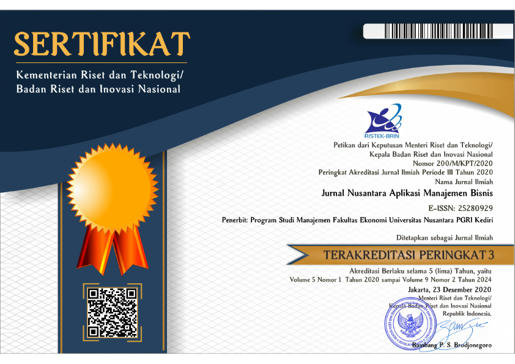Meningkatkan Kinerja Karyawan Melalui Green Human Resource Management: Peran Mediasi Green OCB Dan Green Behavior
DOI:
https://doi.org/10.29407/nusamba.v9i1.21454Keywords:
Green Human Resource Management (GHRM), Performance, Green Organizational Citizenship Behavior (OCB), Green BehaviorAbstract
Research aim: This study explores how Green HRM and Green OCB mediate organizational performance at Blue Pearl Company in Singapore
Methods: This study uses quantitative methods. Data analysis uses Partial Least Square (PLS) with Smart-PLS3 software.
Finding: The study confirmed that Green Human Resource Management (GHRM) significantly influences green behavior and organizational citizenship behaviors (OCB) related to sustainability, which in turn positively impacts employee performance. Specifically, GHRM indirectly enhances performance through both green behavior and green OCB. However, it was found that GHRM does not directly lead to an improvement in employee performance
Theoretical contribution/Originality: These results contribute theoretically by providing empirical evidence of the influence of GHRM on improving employee performance through mediation played by green behavior and green OCB
Practitioner implication: This research contributes as encouragement for companies operating in the manufacturing sector to implement GHRM as a way to improve individual employee performance
Research limitation: The review of sustainability values in the future needs to be reviewed because concern for environmental sustainability in green parks will provide benefits for companies in increasing their sustainability values
Downloads
References
Dessouky, F. E. N., & Alquaiti, H. O. (2020). Impact of Green Human Resource Management (GHRM) Practices on Organizational Performance. 2020 Second International Sustainability and Resilience Conference: Technology and Innovation in Building Designs(51154), 1–4. https://doi.org/10.1109/IEEECONF51154.2020.9319956
Astuti, S. D., Riyanto, F., & Demircioğlu, A. (2023). How Does Green Human Resource Management Improve Sustainable Organizational Performance in Public Services ? 14(2). https://doi.org/10.18196/mb.v14i2.18160
Roscoe, S., Subramanian, N., Jabbour, C. J. C., & Chong, T. (2019). Green human resource management and the enablers of green organisational culture: Enhancing a firm’s environmental performance for sustainable development. Business Strategy and the Environment, 28(5), 737–749. https://doi.org/10.1002/bse.2277
Ghouri, A. M., Mani, V., Khan, M. R., Khan, N. R., & Srivastava, A. P. (2020). Enhancing business performance through green human resource management practices: an empirical evidence from Malaysian manufacturing industry. International Journal of Productivity and Performance Management, 69(8), 1585–1607. https://doi.org/10.1108/IJPPM-11-2019-0520
Goel, P., Mehta, S., Kumar, R., & Castaño, F. (2022). Sustainable Green Human Resource Management Practices in Educational Institutions: An Interpretive Structural Modelling and Analytic Hierarchy Process Approach. Sustainability (Switzerland), 14(19). https://doi.org/10.3390/su141912853
Jehan, Y., Hussai, D., Batool, M., & Imran, M. (2020). Effect of green human resource management practices on environmental sustainability. International Journal of Human Capital in Urban Management, 5(2), 153–164. https://doi.org/10.22034/IJHCUM.2020.02.06
Marditama, T., Yusliza, M. Y., Ghani, L. A., Saputra, J., Muhammad, Z., & Bon, A. T. (2021). Green human resource management and sustainable organization literature: A mini-review approach. Proceedings of the International Conference on Industrial Engineering and Operations Management, 3964–3979.
Piwowar-Sulej, K. (2021). Human resources development as an element of sustainable HRM – with the focus on production engineers. Journal of Cleaner Production, 278, 124008. https://doi.org/10.1016/j.jclepro.2020.124008
Ly, B. (2023). Green HRM and eco-friendly behavior in Cambodian public organizations: The mediation of organizational commitment. Environmental Challenges, 10(December 2022), 100674. https://doi.org/10.1016/j.envc.2022.100674
Shoaib, M., Abbas, Z., Yousaf, M., Zámečník, R., Ahmed, J., & Saqib, S. (2021). The role of GHRM practices towards organizational commitment: A mediation analysis of green human capital. Cogent Business & Management, 8(1). https://doi.org/10.1080/23311975.2020.1870798
Faisal, S. (2023). Green Human Resource Management—A Synthesis. Sustainability (Switzerland), 15(3). https://doi.org/10.3390/su15032259
Bos-Nehles, A. C., Van Riemsdijk, M. J., & Kees Looise, J. (2013). Employee perceptions of line management performance: Applying the AMO theory to explain the effectiveness of line managers’ HRM implementation. Human Resource Management, 52(6), 861–877. https://doi.org/10.1002/hrm.21578
Chowdhury, S. R., Mendy, J., & Rahman, M. (2023). A Systematic Literature Review of GHRM: Organizational Sustainable Performance Reimagined Using a New Holistic Framework. Sustainability, 15(9), 7513. https://doi.org/10.3390/su15097513
Chen, T., & Wu, Z. (2022). How to facilitate employees’ green behavior? The joint role of green human resource management practice and green transformational leadership. Frontiers in Psychology, 13(August), 1–11. https://doi.org/10.3389/fpsyg.2022.906869
Darban, G., Karatepe, O. M., & Rezapouraghdam, H. (2022). Does work engagement mediate the impact of green human resource management on absenteeism and green recovery performance? Employee Relations, 44(5), 1092–1108. https://doi.org/10.1108/ER-05-2021-0215
Mi, L., Sun, Y., Gan, X., Yang, H., Lv, T., Shang, K., Qiao, Y., & Jiang, Z. (2020). Promoting Employee Green Behavior Through the Person-Organization Fit: The Moderating Effect of Psychological Distance. Frontiers in Psychology, 11(October), 1–16. https://doi.org/10.3389/fpsyg.2020.568385
Aboramadan, M. (2022). The effect of green HRM on employee green behaviors in higher education: the mediating mechanism of green work engagement. International Journal of Organizational Analysis, 30(1), 7–23. https://doi.org/10.1108/IJOA-05-2020-2190
Tirno, R. R., Islam, N., & Happy, K. (2023). Green HRM and ecofriendly behavior of employees: Relevance of proecological climate and environmental knowledge. Heliyon, 9(4), e14632. https://doi.org/10.1016/j.heliyon.2023.e14632
Lashari, I. A., Li, Q., Maitlo, Q., Bughio, F. A., Jhatial, A. A., & Rashidi Syed, O. (2022). Environmental sustainability through green HRM: Measuring the perception of university managers. Frontiers in Psychology, 13. https://doi.org/10.3389/fpsyg.2022.1007710
Chen, C., Rasheed, A., & Ayub, A. (2023). Does Green Mindfulness Promote Green Organizational Citizenship Behavior: A Moderated Mediation Model. Sustainability, 15(6), 5012. https://doi.org/10.3390/su15065012
Meng, J., Murad, M., Li, C., Bakhtawar, A., & Ashraf, S. F. (2023). Green Lifestyle: A Tie between Green Human Resource Management Practices and Green Organizational Citizenship Behavior. Sustainability (Switzerland), 15(1). https://doi.org/10.3390/su15010044
Khalid, H. A. M., Harun, H., Noor, A. M., & Hashim, H. M. (2021). Green Human Resource Management, Perceived Organizational Support and Organizational Citizenship Behavior towards Environment in Malaysian Petroleum Refineries. SHS Web of Conferences, 124, 11001. https://doi.org/10.1051/shsconf/202112411001
García, Ú. M., Marco‐Lajara, B., Zaragoza‐Sáez, P. C., Manresa‐Marhuenda, E., & Poveda‐Pareja, E. (2022). Green ambidexterity and environmental performance: The role of green human resources. Corporate Social Responsibility and Environmental Management, 29(1), 32–45. https://doi.org/10.1002/csr.2171
Pasek, I. K., Lina, N. P. M., Sumetri, N. W., Siwantara, I. W., & Sukarta, I. W. (2022). Promoting Green Human Resources Management to Business Model Innovation in SMEs. Proceedings of the International Conference on Applied Science and Technology on Social Science 2022 (ICAST-SS 2022), 282–287. https://doi.org/10.2991/978-2-494069-83-1_51
Awwad Al-Shammari, A. S., Alshammrei, S., Nawaz, N., & Tayyab, M. (2022). Green Human Resource Management and Sustainable Performance With the Mediating Role of Green Innovation: A Perspective of New Technological Era. Frontiers in Environmental Science, 10(June), 1–12. https://doi.org/10.3389/fenvs.2022.901235
Merlin, M. L., & Chen, Y. (2022). Impact of green human resource management on organizational reputation and attractiveness: The mediated-moderated model. Frontiers in Environmental Science, 10(September), 1–16. https://doi.org/10.3389/fenvs.2022.962531
Shah, N., & Soomro, B. A. (2023). Effects of green human resource management practices on green innovation and behavior. Management Decision, 61(1), 290–312. https://doi.org/10.1108/MD-07-2021-0869
F. Hair Jr, J., Sarstedt, M., Hopkins, L., & G. Kuppelwieser, V. (2014). Partial least squares structural equation modeling (PLS-SEM). European Business Review, 26(2), 106–121. https://doi.org/10.1108/EBR-10-2013-0128
Zeng, N., Liu, Y., Gong, P., Hertogh, M., & König, M. (2021). Do right PLS and do PLS right: A critical review of the application of PLS-SEM in construction management research. Frontiers of Engineering Management, 8(3), 356–369. https://doi.org/10.1007/s42524-021-0153-5
Hair, J. F., Risher, J. J., Sarstedt, M., & Ringle, C. M. (2019). When to use and how to report the results of PLS-SEM. European Business Review, 31(1), 2–24. https://doi.org/10.1108/EBR-11-2018-0203
Afthanorhan, A., Awang, Z., & Aimran, N. (2020). An extensive comparison of CB-SEM and PLS-SEM for reliability and validity. International Journal of Data and Network Science, 4(4), 357–364. https://doi.org/10.5267/j.ijdns.2020.9.003
Sarstedt, M., Hair, J. F., Nitzl, C., Ringle, C. M., & Howard, M. C. (2020). Beyond a tandem analysis of SEM and PROCESS: Use of PLS-SEM for mediation analyses! International Journal of Market Research, 62(3), 288–299. https://doi.org/10.1177/1470785320915686
Dash, G., & Paul, J. (2021). CB-SEM vs PLS-SEM methods for research in social sciences and technology forecasting. Technological Forecasting and Social Change, 173(August), 121092. https://doi.org/10.1016/j.techfore.2021.121092
Kim, T. (2022). Assessing the Impacts of Individual and Organizational Factors on South Korea Hotels’ Green Performance Using the AMO Model. International Journal of Environmental Research and Public Health, 19(16). https://doi.org/10.3390/ijerph191610440
Zacher, H., Rudolph, C. W., & Katz, I. M. (2023). Employee Green Behavior as the Core of Environmentally Sustainable Organizations. Annual Review of Organizational Psychology and Organizational Behavior, 10, 465–494. https://doi.org/10.1146/annurev-orgpsych-120920-050421
Freire, C., & Pieta, P. (2022). The Impact of Green Human Resource Management on Organizational Citizenship Behaviors: The Mediating Role of Organizational Identification and Job Satisfaction. Sustainability (Switzerland), 14(13). https://doi.org/10.3390/su14137557
Katz, I. M., Rauvola, R. S., Rudolph, C. W., & Zacher, H. (2022). Employee green behavior: A meta-analysis. Corporate Social Responsibility and Environmental Management, 29(5), 1146–1157. https://doi.org/10.1002/csr.2260
Downloads
Published
Issue
Section
License
Authors who publish with this journal agree to the following terms:
- Copyright on any article is retained by the author(s).
- The author grants the journal, the right of first publication with the work simultaneously licensed under a Creative Commons Attribution License that allows others to share the work with an acknowledgment of the work’s authorship and initial publication in this journal.
- Authors are able to enter into separate, additional contractual arrangements for the non-exclusive distribution of the journal’s published version of the work (e.g., post it to an institutional repository or publish it in a book), with an acknowledgment of its initial publication in this journal.
- Authors are permitted and encouraged to post their work online (e.g., in institutional repositories or on their website) prior to and during the submission process, as it can lead to productive exchanges, as well as earlier and greater citation of published work.
- The article and any associated published material is distributed under the Creative Commons Attribution-ShareAlike 4.0 International License












